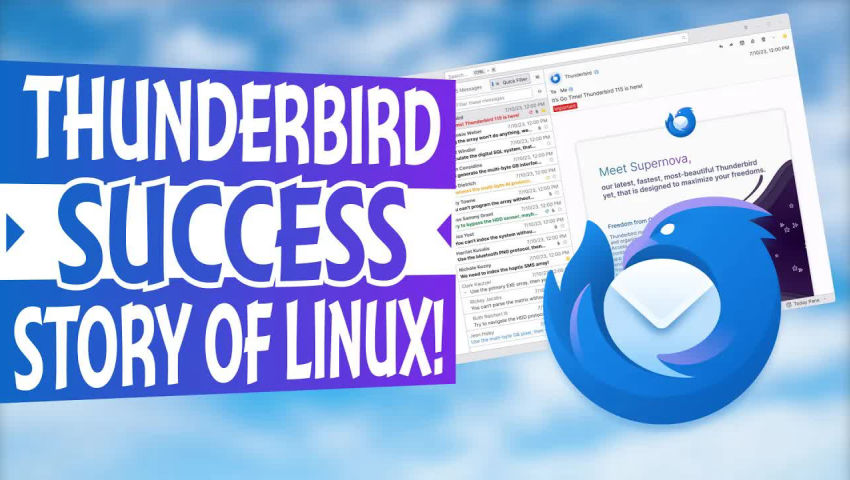I can’t find KDE’s financial report, but in a video I watched it was claimed that Thunderbird collected more donations than KDE. It seems quite hard to believe, but in 2022 Thunderbird collected more than 6,4 million dollars.
KDE is an entire desktop environment, with a bunch of applications and even partnerships that have yielded a KDE laptop. Should Thunderbird have been able to collect more money than KDE itself, there might be something that KDE can learn from Thunderbird.
Edit: Added the link to the video that I watched



They have KDE connect and some other tools but I’m not aware of how popular they are even for Linux users. A lot of it is duplication of other already popular tools available. And their bittorrent client sucks in my humble opinion.
I would expect for most users KDE is just another window manager for Linux. Secondly it’s not even the most popular. So I would expect its user numbers to be much smaller.
Krita has been downloaded in the millions. Kdenlive is getting there, as is KDE Connect since they now support Windows and macOS. GCompris is used by 10s of millions of kids in schools and homes all over the world.
Cool thanks for the info
What’s wrong with KTorrent? Also KDE has a ton of apps (like 200 of them last time I counted). Many of them are certainly the most popular tool for what they do on Linux. On other operating systems, they’re usually not very popular, tho. Krita is probably the most popular of the bunch and might even be more popular than Plasma. It raises its own funds independently from the rest of KDE, tho. It’s also probably still nowhere near Thunderbird’s popularity.
@Toes @parens KDE has similar market share as Gnome and thats despite Gnome being the default.
I suspect it’s because Thunderbird appeals to the GNU crowd being GPLv2 and written in C. They are quite loud and active.
I think most people who use KDE aren’t as vocal or ardent in their free software beliefs
Yeah that’s a fair point. I’m currently using kubuntu and enjoy it more than other distros I’ve tried. But I’ve never felt a strong desire to adopt all the tools. It took me a long while to realize that the themes store is more or less dead and theme authors expect you to install a 3rd party tool (Kvantum) to get the real theme. I wish they would make that more obvious, cause when you’re browsing themes in KDE none of that is obvious and you left wondering why it didn’t do much.
@Toes I have the real reason!
I tried to donate and the recurring webpage won’t render in browser or desktop Firefox.
Also it is in Euro’s with no information on what that is in your local currency.
Lastly I haven’t heard of a single bank in the list of direct debit list.
Basically I think they’ve made it too hard for UK/USA/RoW to donate.
Hi,
Which website are you going to donate? Have you tried this or this?
Let me know if you have any trouble and thanks for your support.
@Bro666 yes the issues is in the Donerbox element.
It doesn’t resize on Firefox and there aren’t embedded scrollbars. So when you get to the 3rd screen you can’t progress
Issue affects desktop and mobile versions of Firefox.
That is strange. It is resizing for me depending on the payment option I choose, showing all the info without the need of scrolling. I am using the desktop version of Firefox.
Can you try one of these for me?:
https://donorbox.org/kde-become-a-member
https://donorbox.org/kde-community
@Bro666 That links works, but running the latest Firefox on Debian bookworm, MacOS and Andriod I get the following:
It is difficult to get hard figures about these things, as KDE software is downloaded from many different sources, many of which don’t track details because of privacy concerns (we don’t track personal data of any kind either, by the way).
But we can infer indirectly what the most used (and probably most downloaded) package is and that would be GCompris by a very long way. We know this because
we have the confirmation from the educational department of one of the most populated provinces in India (specifically Kerala) where GCompris used daily by approximately 4 million pupils. We also know it is used extensively in other areas of India.
it is the software that pops up organically more often on non-FOSS social media platforms where teachers hang out (for example, Instagram). Through these interactions, we know it is used extensively in schools and by parents in most of the world.
Second in the list would be Krita, again by inferring from several sources, like the number of downloads from the Microsoft Store (most s Krita users are on Windows), Google Play Store, and familiarity with the software in design-themed social media groups.
Most people who use these apps are not aware that KDE exists and are not familiar with the concept of Open Source. For them it is just some software they found or was recommended that happens to be free.
Plasma is not at the top of the list, but usage is probably in the millions thanks to things like the Steam Deck and large installation in public institutions (including throughout NASA, CERN and again the computer labs of many schools).
But, then again, it makes sense that determined apps be used more than the desktop environment: installing and using an app for a specific purpose (to play educational activities or paint a pictures, for example) is much, much easier and familiar as a task for end users than installing a whole new OS and desktop environment on top.
This also explains the success of Thunderbird.